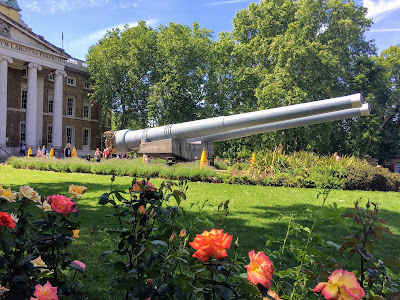One of the famous red telephone booths
When
I was little my mom made a bedtime rule: if we kids were tucked in bed by 8:30
we could stay awake reading for another half hour. In summertime it was
excruciating to go to bed with the sounds of neighborhood kids playing outside
and the sun still up, but we did it religiously for years—just for those extra
30 minutes of reading. Reading was heaven and made bedtime not so dreadful.
Raised
on C. S. Lewis and Roald Dahl, I had my eyes fixed on England long before I
ever planned to come visit. I longed to see the “tube,” to eat a “biscuit,” to walk down
cobbled streets through curtains of rain. In practically every children’s book I was exposed to the place was magic, for crying out
loud. So it should be no surprise that England, birthplace of so many beloved
classics, had me hypnotized, and when I decided to do a study abroad I knew
right away that London was the place for me.
Well,
it’s been six weeks . . .
*Satisfied sigh*
And
England did not disappoint . . .
The wild landscape is incredible, the cultivated gardens equally stunning. I definitely felt a thrill looking out over the moors Charlotte Bronte drew on to write Jane Eyre. How can I say how cool it was that everything was just like in the books? A movie buff might get a similar thrill from walking through the set of a favorite film. For me, that has been the magical part of England--the literature and art that's poured forth in a flood and swept the world, so that I can come here and connect the wonderful things I've grown up reading to real life experiences. Where else would that be possible to such a large degree?
Garden at Stourhead
A room at the Stourhead Estate house
A tree in Hyde Park
A balcony in the British Museum, which held practically every famous thing I'd ever seen in a textbook
Winged Nike at the Louvre
Every street, every building here is steeped in history and meaning. The very air is thick with centuries of layered adventure, and civilization's turning points are stacked together like knick-knacks in an antique shop. What does it do to a place to have a millennia of cultivation settled in its bones.
A view of the townhouses across the street from ours
Old graveyard by the Bronte House
The culture's age was a difference from my home that I expected. But oddly
enough, I think the thing that’s struck me most over this program has been just
how similar people here are to people back home. Even when we visited
France, where the language barrier was very real, everything was still so
similar. People were friendly. They talked to us about their jobs, their favorite sites, etc. Never having been outside the States before, I’d always built up other
countries as these very exotic, very “other” places, filled with people who
held totally different viewpoints from me. That made them exciting, but also a
tad bit unrelatable. I anticipated that I could visit England, I could fall in
love with it, but on some fundamental level I would never be able to see it from
any perspective other than that of outsider.
How
wrong I was.
From
the moment I passed through border control to the moment I stepped off the bus
from our latest excursion a few hours ago, the people here have been nothing but
welcoming. And London itself, filled to the brim with different cultures and
peoples is testament to the fact that here anyone from anywhere can find a
home--and that's another kind of magic entirely.
The really marvelous thing is that, even though they may hold different beliefs or
have different lifestyles, the people here have just as much love for their
families, just as much interest in the future as people from home. In a very real way, it's shown me just how easily people from different backgrounds can become friends.
At the Sikh temple
I
especially loved attending my congregation in Blackheath. It was a smaller one,
of only forty or so people, but that really allowed me the chance to get to
know some of the members one on one. And even in such a small pool, people
still hailed from all over the world. In a way, I as an American fit right in.
It made me wonder what the experience of a Londoner visiting the States might
be. Would they find the atmosphere quite so warm? Would they feel that the
place fit them like a glove? I suppose it entirely depends on where they went.
A side effect of being a country that could fit the UK inside itself forty
times is that the U.S.A sometimes feels as if it has few overarching goals that every
region works towards to define the nation. But perhaps so many different
regions is a type of diversity we excel in.
This
trip has been deeply satisfying in so many ways. A few days ago, I started
reading a UK edition of Harry Potter. It’s been exciting to suddenly understand
little details I always skated over before: Dumbledore’s scar of the London
Underground, Dean Thomas’ West Ham poster, Mint Humbugs, Paddington Station—it’s
fun to be able to picture things exactly.
And
of course the candy has been a wild improvement, one I will be loathe to
relinquish.
But
the ability to picture people from another country as simply people and not faceless strangers is something I
won’t be leaving behind. It’s been incredibly valuable to learn that the world
is a lot smaller place than I’d always thought.
View from the top of St. Paul's Cathedral



























